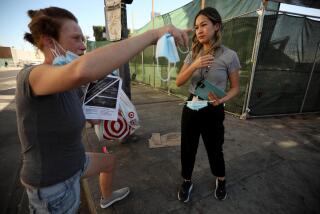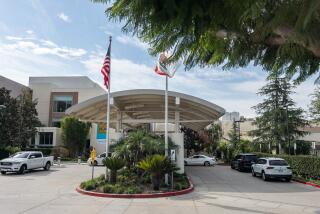More Patients Got Wrong Syphilis Medication at Gay Center, CDC Says
The Los Angeles Gay & Lesbian Center administered the wrong kind of penicillin to more than 650 patients treated for syphilis or who had reported having contact with someone known or believed to have the disease, a federal investigation has shown.
That’s more than twice as many patients as previously believed.
The Centers for Disease Control and Prevention said Thursday that the inadvertent use of the wrong drug was discovered only after a patient read a package insert stating that the medicine he had received was not intended for the treatment of syphilis.
Superficial symptoms apparent in early stages of syphilis can disappear, leading some of the infected to believe that they no longer have the disease, health officials say. Years later, the disease can reemerge, causing paralysis, blindness, dementia and death.
Use of the wrong drug by the Gay & Lesbian Center began in January 1999 and continued until the error was discovered a year ago, officials said. At that time, only about 300 people were thought to have received the wrong drug.
Penicillin therapy is a mainstay of treatment for syphilis, but different formulas exist, county health officials said. Clients at the Center got Bicillin C-R instead of Bicillin L-A, the trade name for benzathine penicillin G.
Bicillin C-R contains only half the dose of benzathine penicillin G that the CDC recommends for treating syphilis.
From January 1999 to March 2004, 429 male patients with confirmed syphilis infections got Bicillin C-R, investigators said. An additional 234 patients, all but five of them men, got Bicillin C-R after reported sexual contact with someone known or thought to have syphilis.
Data compiled Jan. 26 showed that investigators were able to contact 282 of the 429 patients with confirmed syphilis. Of the 282, 255 were treated with the correct drug, eight await evaluation and 19 refused to be treated again.
The investigators were able to reach 116 of the 234 people who reported sexual contact with someone known or thought to have the disease. Of the 116, 98 were retested and 22 of them showed evidence of a previous syphilis infection. Nineteen were treated again and three refused treatment.
As a result of the investigation, King Pharmaceuticals, whose subsidiary, Monarch Pharmaceuticals, markets Bicillin products, has agreed to packaging and label changes to cut the chance that syphilitics inadvertently get Bicillin C-R.






